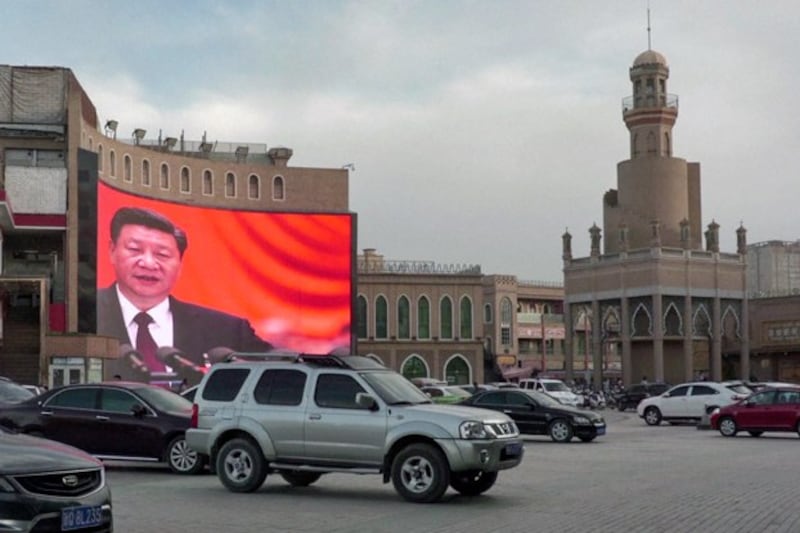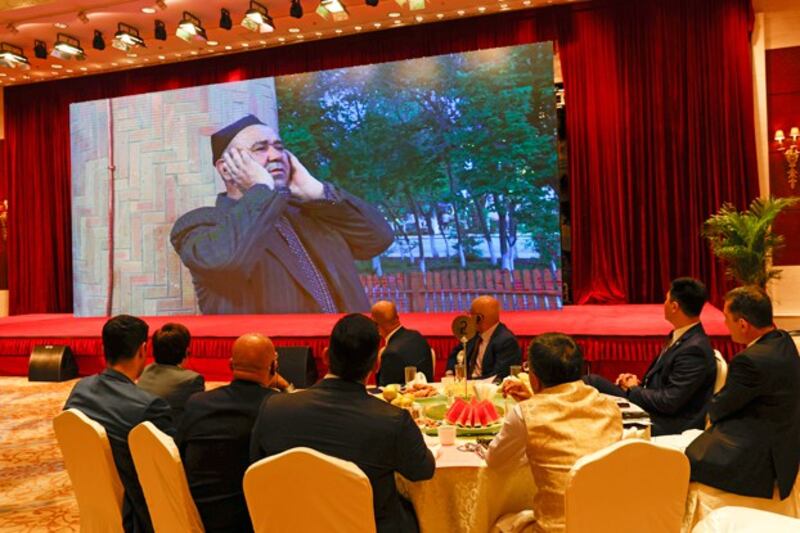On an important Muslim holiday last month, police and security officials in China’s far-western region of Xinjiang set up camps to keep an eye on Uyghurs, took Uyghurs to see communist-themed films, and visited Uyghur homes to make sure they weren’t practicing Muslim religious activities.
The moves around the Qurban Eid, also known as Eid al-Adha or the Feast of the Sacrifice, which fell on June 17 this year in Xinjiang — one of two official Muslim holidays in China — appeared to be attempts to undermine the observation of the Muslim holy day, outside experts said.
Chinese authorities are trying to weaken Uyghurs’ ethnic and religious identity and forge their loyalty to the Chinese state and the Communist Party, while maintaining security, the experts said.
“It looks like they are trying to Sinicize Eid,” said Erkin Ekrem, a professor at Hacettepe University in Ankara, Turkey, and vice president of the World Uyghur Congress.
“The Chinese government is trying to change the Eid customs, prayers and traditions [by] making Uyghurs consume food along with Chinese people [and] adding Chinese elements to the Eid festivals, thereby removing the Muslim Eid elements,” he added.
RELATED STORIES
[ China pushes ‘Sinicization of Islam’ in Xinjiang as Ramadan arrivesOpens in new window ]
[ Most Uyghurs banned from praying on Islamic holiday, even in their homesOpens in new window ]
[ Chinese use Muslim holiday for propaganda purposes, celebrating with UyghursOpens in new window ]
Before 2017, when the Chinese government started cracking down on religious activities in the predominantly Muslim region, men would observe the holiday by visiting mosques for special prayers, cooking meals, spending time with relatives and welcoming guests to their homes.
Since then, authorities have also forbidden Islamic dress for women, beards for men, and Muslim names for children. They have also prevented Uyghurs from fasting during the Islamic holy month of Ramadan and encouraged the consumption of pork and alcohol, which Islam forbids.
Chinese national consciousness
On the eve of Eid, Ma Xingrui, Communist Party secretary of Xinjiang, visited communities in Urumqi, the region’s capital, and asked residents to strengthen Chinese national consciousness and insist on the Sinicization of Islam.
Public security officers celebrated the holiday with Uyghurs and other ethnicities in Xinjiang and promoted "the common consciousness of the Chinese nation," the Xinjiang Daily reported on June 19.

The Keriye County Public Security Bureau in Hotan invited teachers at area primary schools, students and parents on June 16 to participate in social activities at a police camp to “build strong Chinese national consciousness and celebrate Eid,” the report said.
On the same day, police in Qitai county in the Changji Hui Autonomous Prefecture invited Uyghur “relatives” with whom they had been paired up under a previous monitoring program to visit a museum to watch communist-themed films.
On June 17, members of the Public Security Bureau in the prefecture’s Manas county visited Uyghur homes and danced with residents, who had no choice but to join in, the news report said.
“The police showed their concern for the public by their actions and also planted the seeds of national unity deep in everyone’s hearts,” it said.
Assimilation policies
Henryk Szadziewski, director of research at the Uyghur Human Rights Project, said public security agents interfere in Muslim holidays like Eid al-Adha to push assimilationist policies in Xinjiang.
Uyghur identification with Turkic culture along with a belief in Islam and related social and political values are considered a threat because they are outside the control of the Chinese state, he told Radio Free Asia.

“China’s policies are intended to weaken those kinds of affinities outside which are beyond the borders of China and to ensure Uyghurs allegiances are pinned to the Chinese state and, of course, the Chinese Communist Party,” Szadziewski said.
But the Chinese government separates Islam in China from Islam in the rest of the world, Erkin Ekrem of the World Uyghur Congress said.
“In China, the Sinicization of Islam is being carried out vigorously,” he told RFA. “They are trying to create a nation away from Islamic beliefs and customs.”
“Deemphasizing the religion adding in this secular Chinese national consciousness [is] meant to delink Eid al-Adha from its religious origin,” he said. “That is one of the aims here.”
Translated by RFA Uyghur. Edited by Roseanne Gerin and Malcolm Foster.
